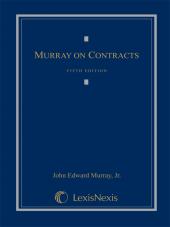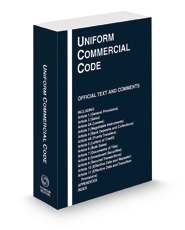
Below you will find a variety of resources listed that can be helpful for you in understanding the law of contracts. We have listed the resources according to different types. The types are described below.
Online Resources: These are collections of resources that are available online. Online books are also hyperlinked when available through our library as e-books. Aspen and West Academic provide e-books and include a variety of the book types described this guide. CALI is an online learning platform that uses more interactive lessons than traditional books. You may also find many secondary sources online through Westlaw, Lexis, and Bloomberg Law although they are not linked here.
Casebooks and Class Books: Casebooks are the textbooks used most frequently in law classes. They consist of short explanations combined with excerpts from cases. The standard law school class will have you read cases, analyze them, and answer questions about them as the primary mode of instruction. Class books are ones that may be required or recommended by your professor, please see your First Assignment list or syllabus to see which books are listed.
Class and Exam Prep: These books are grouped together because their focus is more on classroom and exam success than on explanation and understanding of the law. The most common of these books will involve sample law exam questions and outlines of materials frequently covered in law school classes.
Treatises, Hornbooks, and Short Explanations: These books are grouped together because they are focused on explaining or understanding the law rather than specifically on classroom or exam success. However, understanding the law can help greatly with success in a class. Loosely, treatises are larger than hornbooks, and hornbooks are larger than short explanations. The larger the book (which sometimes can even come in multiple volumes) the more in-depth treatment you are likely to receive. Treatises are detailed books, often with multiple volumes, that describe and explain a particular area of law. They can be particularly useful for learning the nuances of the law with citations to primary sources. Hornbooks are smaller versions of treatises. Short Explanations are great if you are just looking for rules of law with brief explanations attached. Some examples of short explanations include Nutshells and Short & Happy Guides.
Restatements and the UCC: These are sources that are secondary sources (not law), but are frequently quoted by and relied on by judges and legislatures. Restatements are written by a group of leading legal experts in a field and state what the laws are across the jurisdictions as way to synthesize and compile the common law in the United States. Restatements are sometimes incorporated by judges in opinions and the language from the restatements may become law that way. The UCC stands for the Uniform Commercial Code and is a model code about commercial transactions that has been adopted in some form by state legislatures across the country.
 Farnsworth on Contracts
by
From publisher: Busy practitioners count on Farnsworth's proven ability to identify the essentials and omit extraneous material. His comprehensive coverage of the full range of contract law answers questions in hundreds of important areas, including:
Good faith and fair dealing
Precontractual liability
Agreements to negotiate
Vienna Convention on International Sales Contracts
UNIDROIT principles
Constitutional issues
Settlement of disputed claims by check
Options and rights of first refusal
Employee handbooks
Covenants not to compete
Self-help measures
Farnsworth illustrates how contemporary contract law has been shaped by both the Restatement (Second) of Contracts -- for which he served as Reporter -- and the Uniform Commercial Code. Easy access to specifics, new cases, new drafting tips, new references, and timesaving features like cross-referenced cases and marginal headings make this three-volume set a valuable resource for contracts research and practice, including litigation and arbitration. Farnsworth on Contracts, Fourth Edition is the most authoritative contracts treatise available.
Farnsworth on Contracts
by
From publisher: Busy practitioners count on Farnsworth's proven ability to identify the essentials and omit extraneous material. His comprehensive coverage of the full range of contract law answers questions in hundreds of important areas, including:
Good faith and fair dealing
Precontractual liability
Agreements to negotiate
Vienna Convention on International Sales Contracts
UNIDROIT principles
Constitutional issues
Settlement of disputed claims by check
Options and rights of first refusal
Employee handbooks
Covenants not to compete
Self-help measures
Farnsworth illustrates how contemporary contract law has been shaped by both the Restatement (Second) of Contracts -- for which he served as Reporter -- and the Uniform Commercial Code. Easy access to specifics, new cases, new drafting tips, new references, and timesaving features like cross-referenced cases and marginal headings make this three-volume set a valuable resource for contracts research and practice, including litigation and arbitration. Farnsworth on Contracts, Fourth Edition is the most authoritative contracts treatise available.
 Murray on Contracts
by
From publisher -- The critical analyses presented in the latest edition of Murray on Contracts provide students with the insights necessary to gain a comprehensive understanding of the law of contracts. This text also considers and critically analyzes statutory modifications of neoclassical contract doctrine beyond the UCC.
Many of the sections contain captioned subdivisions so that the reader is more easily directed to topical discussions within the sections. The author includes citation tables to Restatement and UCC sections as well as a table of cases, along with an expansive index. In addition, the appendix includes the text of the United Nations convention on Contracts for the International Sale of Goods (CISG), and the final chapter provides an introduction to the CISG and compares its key provisions with the UCC and other principles of American contract law.
Murray on Contracts
by
From publisher -- The critical analyses presented in the latest edition of Murray on Contracts provide students with the insights necessary to gain a comprehensive understanding of the law of contracts. This text also considers and critically analyzes statutory modifications of neoclassical contract doctrine beyond the UCC.
Many of the sections contain captioned subdivisions so that the reader is more easily directed to topical discussions within the sections. The author includes citation tables to Restatement and UCC sections as well as a table of cases, along with an expansive index. In addition, the appendix includes the text of the United Nations convention on Contracts for the International Sale of Goods (CISG), and the final chapter provides an introduction to the CISG and compares its key provisions with the UCC and other principles of American contract law.
 Contract Law and Theory
by
From publisher -- Contract Law and Theory, the leading theoretical casebook on contracts, is based on clear, discernible themes and patterns that underlie much of contract law, and as it develops them explicitly, the student is invited to develop a working model of contract law. This framework for analyzing and predicting the outcome of contract disputes is then tested through careful case and doctrinal analysis. Contract Law and Theory begins with an overview chapter. Many of the following chapters contain introductory essays presenting some of the basic doctrines and theoretical approaches covered in the chapter. The Fifth Edition has added new cases reflecting contemporary developments, particularly in the areas of precontractual liability, preliminary agreements, and collaborative contracts. The authors have also carefully rewritten and edited the text and essays and have shifted a number of principal cases to notes—to both condense the book for easier coverage in four-hour courses and to enhance the book's accessibility to students.
Contract Law and Theory
by
From publisher -- Contract Law and Theory, the leading theoretical casebook on contracts, is based on clear, discernible themes and patterns that underlie much of contract law, and as it develops them explicitly, the student is invited to develop a working model of contract law. This framework for analyzing and predicting the outcome of contract disputes is then tested through careful case and doctrinal analysis. Contract Law and Theory begins with an overview chapter. Many of the following chapters contain introductory essays presenting some of the basic doctrines and theoretical approaches covered in the chapter. The Fifth Edition has added new cases reflecting contemporary developments, particularly in the areas of precontractual liability, preliminary agreements, and collaborative contracts. The authors have also carefully rewritten and edited the text and essays and have shifted a number of principal cases to notes—to both condense the book for easier coverage in four-hour courses and to enhance the book's accessibility to students.
 Contract Law and Theory Document Supplement
by
This new companion Document Supplement (which can be used with any contracts book) contains Articles 1 and 2 of the UCC, selected provisions (including the Official Comments) of the Restatement (Second) of Contracts, and selected provisions of the CISG.
Contract Law and Theory Document Supplement
by
This new companion Document Supplement (which can be used with any contracts book) contains Articles 1 and 2 of the UCC, selected provisions (including the Official Comments) of the Restatement (Second) of Contracts, and selected provisions of the CISG.
 Uniform Commercial Code Official Text and Comments
by
Also available on Bloomberg Law, Lexis, and Westlaw. From publisher -- Uniform Commercial Code contains the complete official Uniform Commercial Code (UCC) – all of the 13 Articles' text with official comments. This volume is intended for use as a quick reference. Information is arranged in one softbound volume and is arranged by Article for fast and easy access. Features include:
Appendixes that include Permanent Editorial Board commentaries, past amendments, and pre-revision articles
A foreword by the chair of the permanent editorial board of the UCC
Commentaries and reports of the permanent editorial board
Uniform Commercial Code Official Text and Comments
by
Also available on Bloomberg Law, Lexis, and Westlaw. From publisher -- Uniform Commercial Code contains the complete official Uniform Commercial Code (UCC) – all of the 13 Articles' text with official comments. This volume is intended for use as a quick reference. Information is arranged in one softbound volume and is arranged by Article for fast and easy access. Features include:
Appendixes that include Permanent Editorial Board commentaries, past amendments, and pre-revision articles
A foreword by the chair of the permanent editorial board of the UCC
Commentaries and reports of the permanent editorial board
 Questions & Answers: Contracts
by
From publisher -- Understand better what you're learning in a contracts class by applying concepts as you learn them. Prepare more effectively for exams and the bar exam. This study guide includes 189 multiple-choice and short-answer questions arranged topically for ease of use during the semester, plus an additional set of 42 questions comprising a comprehensive "practice exam."
For each multiple-choice question, Professor Burnham provides a detailed answer that indicates which of four options is the best answer and explains thoroughly why that option is better than the other three options. Each short-answer question is designed to be answered in fifteen minutes or less. For these questions, Professor Burnham provides a thoughtful, comprehensive, yet brief model answer.
Questions & Answers: Contracts
by
From publisher -- Understand better what you're learning in a contracts class by applying concepts as you learn them. Prepare more effectively for exams and the bar exam. This study guide includes 189 multiple-choice and short-answer questions arranged topically for ease of use during the semester, plus an additional set of 42 questions comprising a comprehensive "practice exam."
For each multiple-choice question, Professor Burnham provides a detailed answer that indicates which of four options is the best answer and explains thoroughly why that option is better than the other three options. Each short-answer question is designed to be answered in fifteen minutes or less. For these questions, Professor Burnham provides a thoughtful, comprehensive, yet brief model answer.